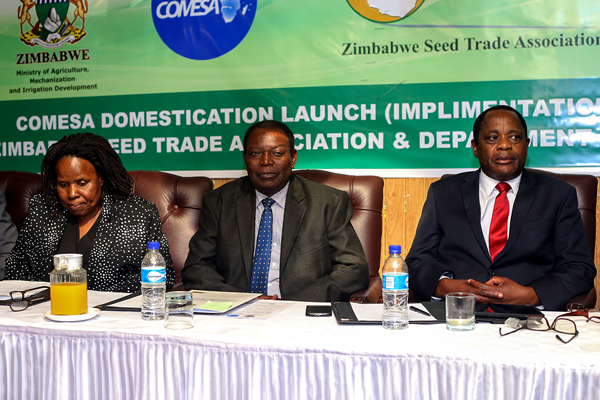
ZIMBABWE’S maize seed demand has surged by half to the current 37 500 tonnes since the beginning of the fast-track land reform programme 17 years ago, a top government official has said.
BY FIDELITY MHLANGA

Zimbabwe embarked on the land reform exercise in 2000 to correct historical imbalances; a move analysts say was responsible for the decimation of agriculture.
Officiating at the Common Market for Eastern and Southern Africa (Comesa) seed trade harmonisation launch yesterday, Agriculture, Mechanisation and Irrigation Development permanent secretary, Ringson Chitsiko said maize seed demand has surged from 25 000 tonnes in 2000 to the current 37 500.
Chitsiko said research has shown that on average 80% of Zimbabwean farmer’s plant their crops using seed sourced from the formal seed system.
Harmonisation is envisioned as a promoter to enhance smooth seed trade across borders.
“The Zimbabwean seed industry has been meeting the local certified seed demand for the maize staple crop, which has increased from 25 000 tonnes before the land reform in 2000 to the current estimated annual requirement of +/-37 500 tonnes enough to plant the annual requirement of 1,8 million hectares of maize,” he said.
The launch is meant to signal the beginning of the implementation of Comesa harmonised seed regulations which have been promulgated in Zimbabwe under Statutory Instrument (SI) 141 of 2016 cited as the plant pests and diseases and SI 142 of 2016 cited as the seeds certification scheme.
- Chamisa under fire over US$120K donation
- Mavhunga puts DeMbare into Chibuku quarterfinals
- Pension funds bet on Cabora Bassa oilfields
- Councils defy govt fire tender directive
Keep Reading
The harmonisation system will create markets for trading excess seed and thereby provide us with the much needed foreign currency, prompting the sharing of improved crop varieties across countries, strengthen seed certification and quality assurance.
Zimbabwe Seed Trade Association president, Denias Zaranyika said the primary object of harmonisation was to integrate small and isolated national seed markets into one larger Comesa market of seed.
“Farmers in the Comesa region, however, continue to be seed insecure as a result of segregated small seed markets which are difficult to access across the continent,” Zaranyika said.
This has been exacerbated by varying procedures pertaining to the variety release seed certification, variety release and phytosanitary quarantining measures for seed in Comesa countries which deny and delay farmers access to new products.” He said the adoption of a harmonised system has a high potential of improving seed flow as well as improve access to new varieties by farmers.
Comesa chief finance officer Gizila Takavarasha said aim of harmonisation of the Comesa seed regulations was to increase regional seed adding that to date Burundi, Kenya, Rwanda, Uganda and Zimbabwe have domesticated with Zambia and Malawi still to finalise the process.
“The purpose of this meeting, therefore, is to create awareness to all seed stakeholders especially seed companies of removal of barriers to seed trade by the government of Zimbabwe. Get to know challenges that could hinder flow of seed cross the Zimbabwe borders into the Comesa countries,” she said.











